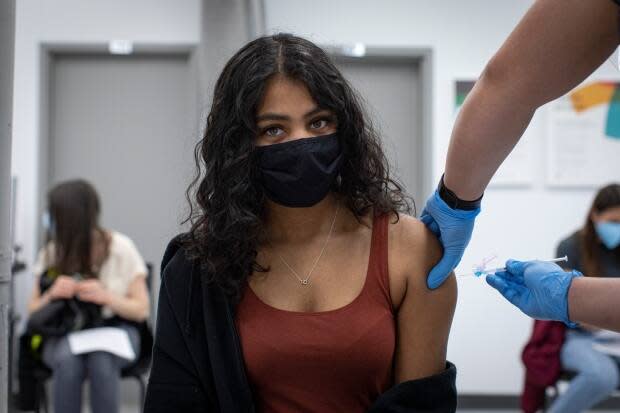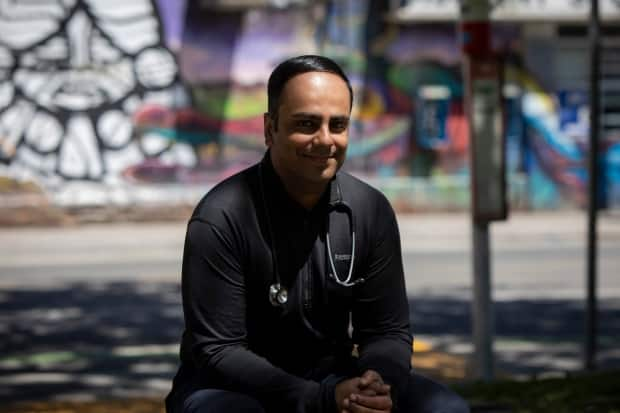Mobile vaccine clinics alone won't work in Toronto's hardest-hit neighbourhoods, experts and officials warn

Ontario's promise to deliver vaccines in hot-spot neighbourhoods via mobile and pop-up clinics has been misguided and haphazardly executed, say public health advocates and officials in Toronto.
Those clinics have been touted by the provincial government as an efficient and accessible way for people aged 18 to 50 to get immunized in the communities hardest-hit by COVID-19.
People in that age group were recently made eligible for vaccination if they live in one of the 114 postal codes designated as hot spots by the province.
However, those eligible residents cannot register for appointments through the provincial booking system and must instead rely on mobile clinics, which typically operate on a first come, first served basis.
"It's one thing to say that there will be a program for a mode of delivery for the vaccine," said Dr. Naheed Dosani, a palliative care physician and health-care activist in Toronto.
"It's another thing to make sure that that mode of delivery has the capacity to actually meet the need."
Dosani is among those concerned that the pandemic's third wave could accelerate further if adults and front-line workers in hot spots do not have efficient and easy access to vaccines.
"They don't actually have the capacity to deliver the vaccine in a robust way [through mobile clinics]," Dosani added.

Health Minister Christine Elliott defended the use of mobile clinics in the legislature on Wednesday, after Ontario NDP leader Andrea Horwath compared them to finding "a needle in a haystack," even for people who are technically eligible.
"Yes, in fact, people 18 years of age and older can be [vaccinated] in a number of these clinics and a number of these pop-up units," Elliott said.
How mobile clinics are supposed to operate
Mobile and pop-up clinics are one of three pillars in Toronto's immunization program, which also includes mass clinics and others operated by pharmacies and health-care providers like hospitals.
Joe Cressy, chair of Toronto's Board of Health, said the city's mass clinics and hospitals are meant to do the heavy lifting in the vaccination campaign, with mobile clinics serving a more specialized role by going to residents in targeted locations, such as seniors' buildings, shelters and workplaces.
"They are not a substitute for regular, consistent, easy-to-register for clinics in our city," Cressy said. "You have to open up that registration system and provide adequate supply so that people can register."
Toronto has identified more than 1,200 possible locations for mobile clinics to set up, and city officials say they have reached 239 of those locations so far. The city does not track how many doses it has delivered specifically at mobile clinics.
Furthermore, Toronto's Medical Officer of Health Dr. Eileen de Villa confirmed earlier this week that Ontario did not provide any additional supply when it said people aged 18 to 50 could get immunized at mobile clinics.
"There was no specific additional vaccine provided for that," de Villa said during Tuesday's Board of Health meeting.
De Villa said the provincial government also did not increase vaccine supply when it made teachers and education workers connected to school boards eligible for vaccination as of this week.
Ontario has more than one million vaccine doses in its reserves at last count.
Calls for better planning before changes are made
Dosani acknowledged that supply issues have complicated Ontario's vaccine rollout, but he said the province should not have started promoting mobile clinics as a realistic option for people in hot-spot communities.
In an email to CBC Toronto earlier this week, Education Minister Stephen Lecce said that "every single child-care worker in these hot-spot communities is eligible to now get the vaccine."
Lecce's office later clarified that eligibility for those workers is restricted to mobile clinics, since they are not yet eligible to book their appointments.
"When these groups don't see the actual road to get there, that can be very disappointing," Dosani said.
"What I hope to see in the future is that before announcements are made … that we actually get a sense of how much capacity these programs have."

